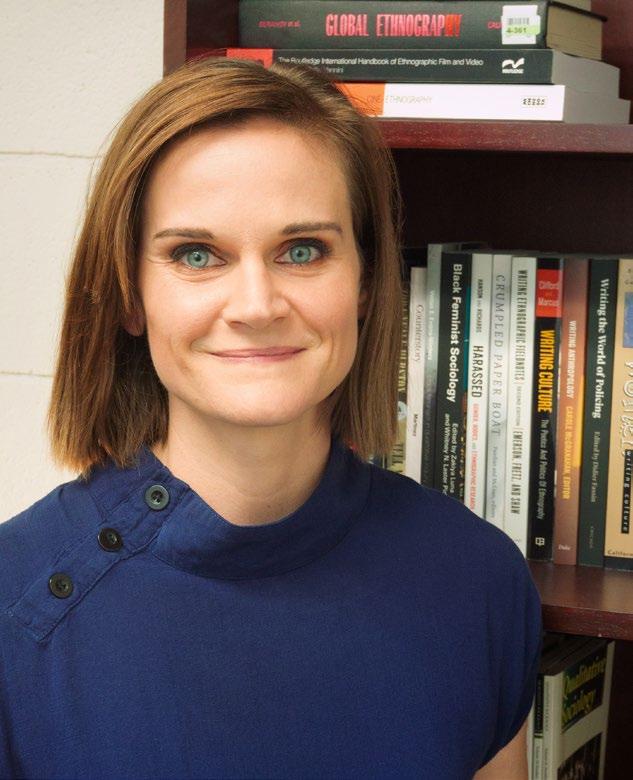
4 minute read
Rebecca Hanson establishes International Ethnography Lab
Along with co-founder Richard Kernaghan, Dr. Hanson envisions lab as a space to strengthen networks of support for pursuing ethnography
For Center professor Rebecca Hanson, conducting research isn’t meant to be a solitary practice. Rejecting the traditional image of the lone academic stooped over their work in isolation, Dr. Hanson instead seeks to affirm the reality that collaboration is intrinsic to research: “Even though ethnographers often write about their work as lone endeavors, no academic project that we engage in is solitary, ever.”
Advertisement
This mentality is threaded throughout the design of her most recent project, University of Florida’s International Ethnography Lab, co-founded with Center affiliate faculty Dr. Richard Kernaghan. Housed in Turlington 3323, the lab offers a space to bring together students and faculty interested in ethnographic research—from those who are actively conducting an ethnographic research project to those who are just interested in qualitative methods or ethnographic approaches more generally.
The idea was borne from the Center’s 70th Annual Conference, “Ethnographic Evidence Across the Americas,” which Dr. Hanson co-organized with Dr. Kernaghan. The conference’s four studentcentered workshops garnered such overwhelmingly positive feedback that Drs. Hanson and Kernaghan were spurred to develop a permanent space for this level of engagement with the practice and craft of ethnography.
While other ethnography labs exist at university campuses across the U.S., Drs. Hanson and Kernaghan sought to set UF apart by centering their lab around a strong international focus. “There are a lot of challenges that are exacerbated or made particularly difficult when you’re doing research in international contexts,” explains Dr. Hanson, whose own research takes place primarily in Venezuela. “We want to provide resources beyond what traditional methods classes can offer, like additional training and support so that researchers are more prepared in the field. We want to have conversations about how to survive and thrive doing research in a way that’s healthy for the researcher and research participants.”
Dr. Hanson’s vision for the lab orbits the firm rejection of research as something that scholars conduct alone. This community of support is designed to endure even throughout the most critical step in the process: during the fieldwork itself. “That’s something that is really, really missing from conversations on fieldwork,” emphasizes Dr. Hanson. To achieve this mission, the lab is equipped with hybrid technology that allows researchers in the field to participate in lab activities remotely.
Hybrid technology also means that the lab encourages participation and exchange from researchers at other institutions across the world, strengthening global networks collaborating on ethnography, both at universities and organizations beyond academia. Dr. Hanson hopes that students and faculty will lean on these international, interdisciplinary linkages to make their research stronger and their research experience better. “One thing I really encourage students to do to the degree that they can when they’re doing international field work is to try to build some kind of network for themselves in the space where they’re doing research so that they have support.”
That kind of support might just begin in the Ethnography Lab itself. Students and faculty are encouraged to stop by the lab to explore the “Qualitative Library,” which houses books and resources on qualitative methods, including guidelines for how to write a qualitative methods research proposal. “You can come into the space, use the resources, drink some tea,” Dr. Hanson suggests. Those who want to engage more actively with the lab can reach out to Dr. Hanson and become a member. Workshops are already planned for the fall, and Drs. Hanson and Kernaghan invite participation not only in these activities but also on how the lab can best serve its community. Driven by his own passion for ethnography, Center professor Clate Korsant has joined them for discussions on the lab’s long-term goals.
Looking ahead, the team plans to develop an ethnography certificate program for undergraduate and graduate students alike. They also hope to offer funding for students conducting ethnographic and qualitative research—something particularly meaningful for supporting international students, Dr. Hanson says. “If we’re going to continue to do what I consider a really important method of research, specifically for our students from Latin America, we need to find ways to remove some of the barriers that make it difficult.”
Perhaps, then, within the networks that the International Ethnography Lab brings together, the myth of the lone researcher will fade completely, replaced with the lived example of a global collaborative academia made practice. ◆










